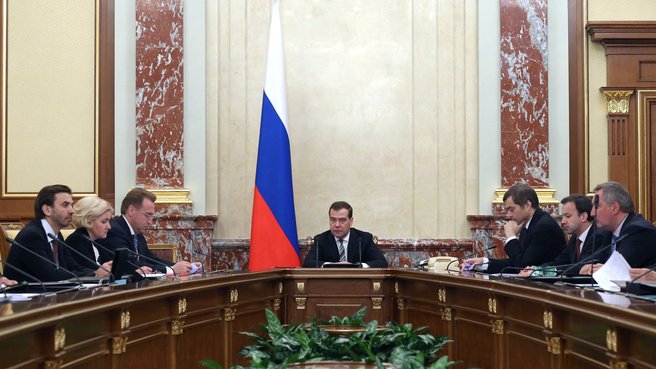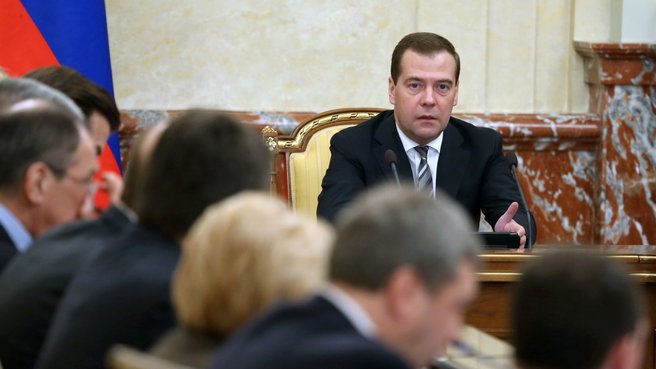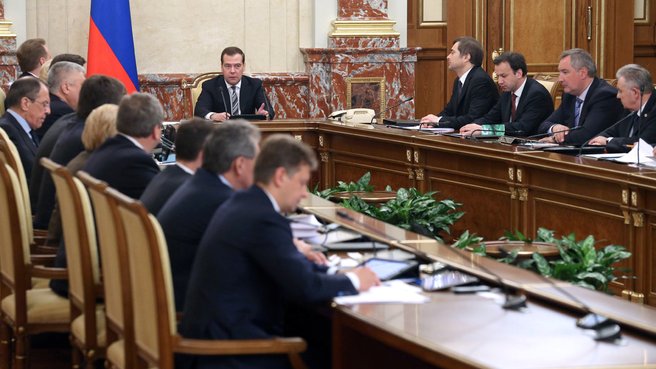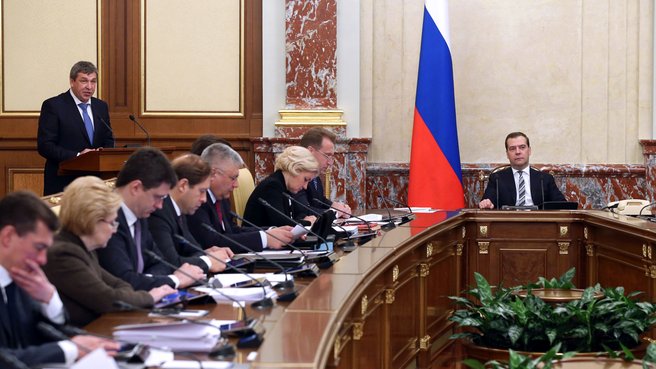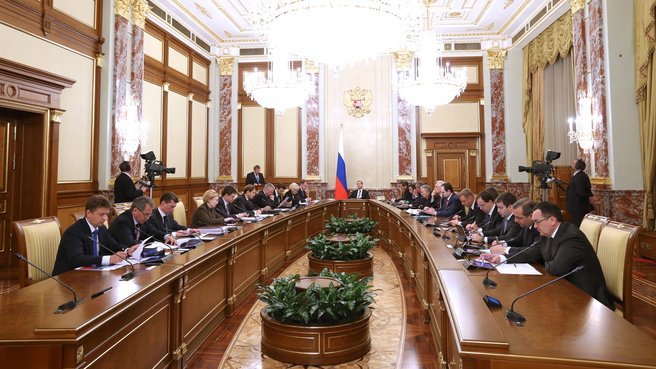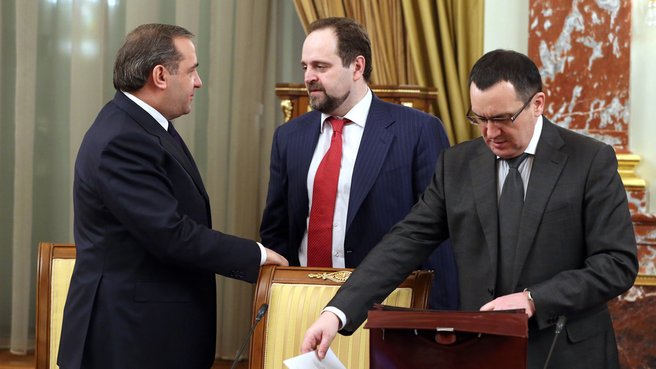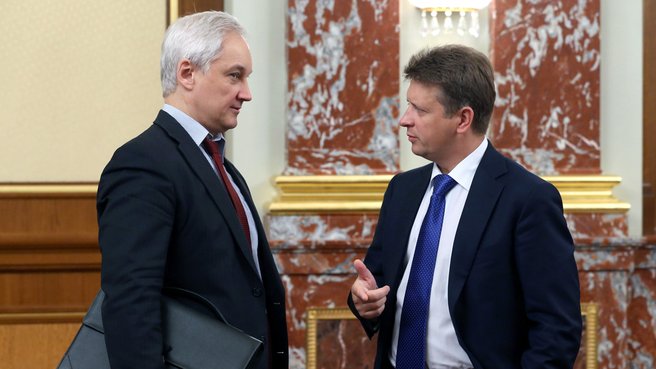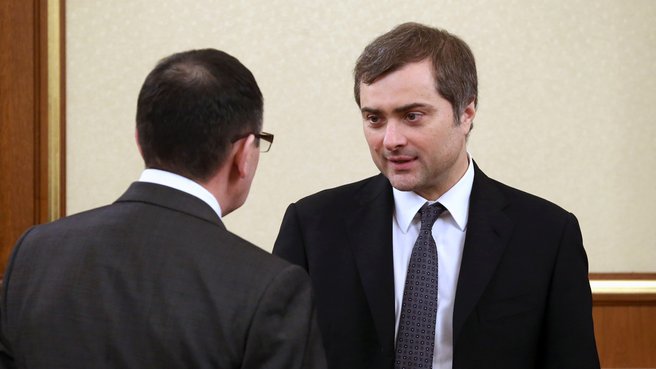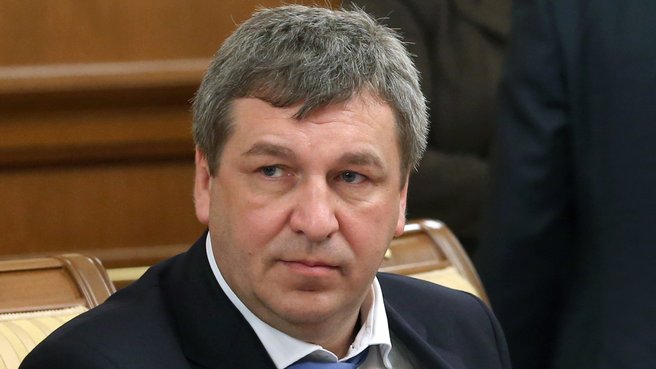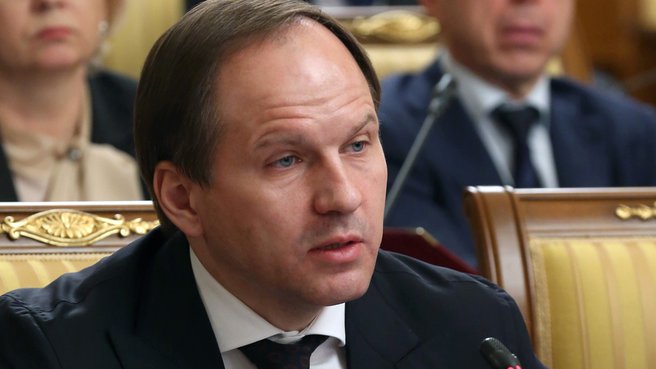Agenda: Action plan to implement the state programme to facilitate the voluntary resettlement of compatriots living abroad to the Russian Federation in 2013-2015 and 13 other issues.
Transcript:
Dmitry Medvedev: Colleagues, yesterday I reported to the State Duma on the Government’s performance in 2012. Government members who were present there heard my report, as well as the deputies’ opinions and the ensuing discussion. As always, there were different responses. On the whole, many opinions were absolutely reasonable and deserve to be assessed by the Government. Criticism is also useful, and there is nothing special about it.
At any rate, I would like to note once again that we must try to find compromises on all items of the agenda, in particular on all the main socio-economic issues. We are not working in a vacuum and everything is relative. The Government used to work in very difficult conditions throughout the 1990s. Currently, the situation is calm and stable. Nevertheless, different viewpoints will always be voiced, and the Government should respond to them in a well-reasoned manner. At the same time, Government members should defend their stance, if they are confident that this stance is correct. In my opinion, that is the responsibility of the top executive authority, which should implement its policies in a well-reasoned and responsible way. I would like to thank Government members and the Government Executive Office staff for their hard work on the Government report for the State Duma.
Thank you for your efforts. I have just discussed this with the President.
I would like to mention another issue. It will soon be one year since the President issued the executive orders on key aspects of national development. These very important and complicated executive orders set highly ambitious goals. In effect, they constitute a roadmap for the entire executive branch and for adopting the relevant laws. The President and I have issued numerous instructions as part of the implementation of these executive orders. Almost 40% of these instructions have already been executed and we must keep up the pace. Naturally, this should not be detrimental to the quality of our work because these are extremely serious, ambitious and long-term objectives. I would like to remind everyone present here about this.
Let us go on to our agenda. Today we will focus on the relocation of compatriots living abroad back to Russia. By the way, I partially discussed this issue yesterday, while replying to some questions. We will discuss an action plan to implement the relevant state programme for 2013-2015.
Many compatriots would like to return to Russia. We consider this to be a positive trend, and support for these people is a highly important development factor, including in the context of accomplishing demographic objectives. It makes it possible to employ skilled specialists in the economy. Every compatriot has his or her own fate, sometimes a difficult background, and every case should be examined individually.
I would like to remind you that the plan calls for drafting regional relocation programmes. The accommodation of compatriots and their living conditions will depend on the regions. This implies the registration of the required documents and the resolution of housing issues. Of course, this also implies employment assistance and various compensations, which are based on the current regulations, including transport expenses and the payment of the so-called relocation allowances.
Overall, two billion roubles will be allocated for the programme in 2013, and three billion roubles in 2014 and 2015. Let’s see what this funding can accomplish. Obviously, we must also focus on monitoring the spending during the implementation of this and other state programmes.
These programmes are being implemented in various regions. We have invited the Governor of the Krasnoyarsk Territory, Mr Lev Kuznetsov, who will tell us how Siberia is implementing this programme.
Over the past few years, we have also been working on creating a barrier-free environment and providing equal employment and career opportunities for disabled persons, as well as for those with health restrictions. This issue was also mentioned in the Government report yesterday. We have employment quotas in place for disabled persons, and these quotas apply to companies employing over 100 persons under the current legislation. At present, Russia has about 680,000 jobs for the disabled. At the same time, there are about 1.8 million disabled in this country. This makes up for a considerable share of the population.
The Government has drafted a law which will allow regional authorities to introduce employment quotas for people with disabilities at companies with 35 to 100 employees. This should help create about 300,000 new jobs for the disabled. This issue is very important, and not only in the economic context because stable jobs and career prospects have an effect on people’s wellbeing. It is a state priority.
Let’s get to work. The Minister of Regional Development has the floor. Mr Slyunyayev, please don’t forget about the time limit.
Igor Slyunyayev (Minister of Regional Development): Mr Medvedev, colleagues.
Presidential Executive Order No 1289 of September 14, 2012 approved a new version of the state programme to facilitate the voluntary relocation of compatriots living abroad to the Russian Federation. The Federal Migration Service is coordinating the implementation of the programme.
First I’d like to sum up the results of the programme’s implementation in 2007–2012. During this period 125,500 people moved to Russia, including 63,000 in 2012. The numbers for the first four months of this year are already over 10,000. Most of them came from Kazakhstan, Uzbekistan and Azerbaijan and 61% of them are Russians. In 2012, 63,000 of our compatriots relocated to the Lipetsk, Omsk and Novosibirsk regions and the Primorye and Krasnoyarsk territories.
The Ministry of Regional Development was instructed to draft a plan of measures for implementing the programme in 2013-2015. It worked on this together with the Ministry of Finance, the Foreign Ministry, the Federal Migration Service and regional executive bodies. The draft ensures coordinated action by federal and regional authorities so as to achieve the goals of the programme. These figures correspond to the indicators of the state programme on regional policy and federative relations which the Government endorsed in March. It plans for the resettlement of at least 25,000 compatriots in 2013 and 50,000 in 2014 and 2015, correspondingly. It also envisages an increase in the number of regions participating in the programme. This year 48 regions are expected to take part in it. At any rate, this is the number of applications we have received so far.
The action plan on implementing the programme for facilitating voluntary resettlement of compatriots to Russia consists of four sections. The first section provides the legal foundation. It contains a list of regulatory acts which must be drawn up for the programme’s successful implementation. In 2013, we plan to draft a presidential directive which will specify the provisions of Executive Order No 1289, and several draft government resolutions aimed at protecting those migrants who held the status of programme participant before January 1, 2013. After the adoption of the regulatory acts, these people, as well as members of their families, will receive relocation allowances and compensation payments – 240,000 roubles for a participant in the programme and 120,000 for each family member.
This year the Government plans to coordinate regional resettlement programmes. The Ministry of Regional Development will draw up methods for drafting and endorsing these programmes. As I’ve mentioned, the ministry has already received 48 draft regional programmes as of April 18. They have been submitted for approval to the federal executive bodies – the Ministry of Labour, the Ministry of Finance, the Federal Migration Service and the Ministry of Healthcare.
The Ministry of Regional Development is drawing up a draft resolution of the Government aimed at reducing the period for coordinating regional programmes from six to three months. This draft resolution will be presented in line with established procedure before the end of this month. The Government will endorse regional programmes by issuing a government executive order.
The second section of the plan deals with institutional and administration measures. It provides for the co-funding of measures envisaged by the regional resettlement programmes (the Ministry of Finance is in charge of this); expenditures on the performance of interim groups abroad and their inspections (the Federal Migration Service and the Foreign Ministry are responsible for this); expenses on the fulfillment of Russia’s public commitments to the participants of the programmes and their family members – reimbursement of their travel and settlement expenses, and the government duty (if migrants do not have a permanent source of income, they will be reimbursed from the federal budget) – this is the responsibility of the Federal Migration Service.
The third section of the action plan provides for analytical and methodological support of the resettlement programme. It consists of the following measures: monitoring the programme’s implementation (the Federal Migration Service is in charge of this); monitoring the migration attitudes of our compatriots in a number of countries, with a view to predicting the potential flow; and assessing the level of knowledge of our compatriots about the state programme (this is the responsibility of the Foreign Ministry). The coordinator of the programme – the Federal Migration Service – will deliver an annual report on its implementation that will cite targeted indicators and accounts of what was done on each item of the plan.
The fourth section of the plan provides information support. It contains measures that are similar to those that were envisaged by Government Resolution No 456 on information support for the programme on facilitating voluntary resettlement in 2010–2012. It includes organisation, dissemination and dispatch of an official information package on the state programme (the Federal Migration Service is in charge of this); support and development of the Compatriots information resource (the responsibility of the Ministry of Regional Development); and the development of tolerance to newcomers on behalf of the residents of the receiving regions by holding annual events of the Integration of Compatriots International Forum (the responsibility of the Ministry of Regional Development).
Now I’d like to say a few words about the funding of the programme. The legal support for it is provided by the Ministry of Regional Development and the Federal Migration Service from their current expenses, and does not require additional allocations from the federal budget. The funding of analytical, methodological and information support for the programme remains the same as in 2012. The figure for 2013 is 135 million roubles, and we plan to earmark an additional 4.9 million roubles in 2014–2015.
The funding of organisational and administrative measures will be increased by 1.9 billion roubles for the payment of allowances and compensations starting in 2014 in connection with the growing number of participants in the programme. All in all, 1.09 billion roubles will be spent on resettlement measures in 2013 and 2.9 billion roubles in 2014-2015.
Mr Medvedev, this draft executive order takes into account the remarks on the draft action plan received from the Government Executive Office, and has been coordinated with federal executive bodies. I’d like to request your support for it.
Dmitry Medvedev: Brilliant. Seven minutes. Are there any questions for Mr Slyunyayev? Or should we first hear about our colleagues' work? Mr Kuznetsov, let’s give the floor over to you. Tell us how this programme is carried out in the Krasnoyarsk Territory and we’ll share our impressions later on.
Lev Kuznetsov (Krasnoyarsk Territory Governor): Mr Medvedev, ladies and gentlemen. The Krasnoyarsk Territory has been taking part in this programme since 2007 as a pilot region. Summing up the results of the past five years, here is the most important thing: the programme has justified our expectations and has reached its goals. It has provided powerful incentives for people to move to Russia from other countries. Importantly, these people are highly qualified specialists working in different social and economic spheres.
Moreover, the number of people who wish to take part in this programme is increasing, as Mr Slyunyayev pointed out. We expected to receive a thousand people but ultimately 1,800 arrived. Over 60% have higher or secondary vocational education and their average age is 37, which is also very important. About half of them prefer to go to rural areas or small towns that do not have enough public sector employees, such as teachers, doctors and cultural workers. This is where we welcome them. In addition to federal initiatives we are providing all sorts of assistance to them in different areas. It depends on each particular situation: we provide additional help either for housing rental, or provide municipal housing, or provide construction materials and land plots for private construction. Therefore, I believe it would be correct to expand this programme; therefore, we support it in general.
Lev Kuznetsov: The Krasnoyarsk Territory has been taking part in this programme since 2007 as a pilot region. Summing up the results of the past five years, here is the most important thing: the programme has justified our expectations and has reached its goals. It has provided powerful incentives for people to move to Russia from other countries. Importantly, these people are highly qualified specialists working in different social and economic spheres.
We have the following concerns and suggestions.
First, I would like to consider the possibility of cutting the time involved in processing the documents by the Federal Migration Service for the participants of this programme, because it currently takes about 60 days. We understand that the labour market is very volatile, and we also aware that competition on the labour market will grow, i.e., cutting this time would be very useful.
Second, four criteria for areas with priority relocation status are being introduced today, including the Far East, border areas, areas with negative demographics and areas with major federal investment projects. You are already aware, Mr Medvedev, that major successes of the programme have been achieved by the Siberian regions as well. So we suggest, given that Siberia and the Far East enjoy priority status, including in public policy, that Siberia be included as the fifth criterion. Then, if the territory complies with two criteria, it would be eligible to claim the status of a priority settlement area, because our needs are really substantial. I am not downplaying the importance of other areas, but I believe we deserve a policy tailored to our own needs.
Third, Mr Slyunayev said that it is very important to have a better consolidated and organised PR campaign. The Ministry of Regional Development should gather information in the regions on a yearly basis and compile a single presentation of each region in the context of the Russian Federation. This should be displayed in our missions abroad and posted on the website, so that anyone who is planning to move to Russia and participate in this programme can have a clear understanding of both the region and the support measures it provides, as well as the specialties that are in demand and that match their preferences. In general, we support this programme and are pleased that it will continue.
Dmitry Medvedev: Do newcomers have any problems adapting to a new location?
Lev Kuznetsov: According to the statistics, only 16 people out of 3,188 went back to where they came from, meaning they don’t have any major problems with adaptation, at least here in the Krasnoyarsk Territory. Judging by the numbers that I saw, the situation is similar in other regions.
Dmitry Medvedev: I see. Does anyone want to add to this? Mr Rogozin, please go ahead.
Dmitry Rogozin: Thank you. Mr Medvedev, colleagues, I would like to comment on this programme. Of course, it would have been particularly important in the early 1990s, with the collapse of a large state and more than 25 million ethnic Russians suddenly becoming foreigners in places that they considered their homeland. However, the programme is still important.
My point is that this is still being implemented in standby mode. That is, our compatriots abroad find this programme themselves, they relocate, there are priority regions and priority projects that they can choose as a place to live in Russia. I would like to ask the Minister for Regional Development to tie this programme in with our goals and objectives in industrial development. Let me give you an example. Six months ago, when we were getting ready for the first flight of the Il-476, the Ulyanovsk plant desperately needed engineers, designers and highly-skilled professionals who worked at the Tashkent aviation enterprise. We then quickly resolved all issues related to their Russian citizenship on a case-by-case basis and flew them to Ulyanovsk. In large part, these specialists made this project a success. We now have more and more such projects, and given our need for technical specialists and highly skilled labour, it is imperative that we adapt this programme to the needs of the Russian economy and the Russian enterprises for specific occupations and in specific regions.
Dmitry Rogozin: Given our need for technical specialists and highly skilled labour, it is imperative that we adapt this programme to the needs of the Russian economy and the Russian enterprises for specific occupations and in specific regions.
Another large-scale project that we have reviewed recently comes to mind – the Vostochny spaceport and the construction of a new town, which may be named after Tsiolkovsky. There, too, we will need highly skilled migrant specialists – in this way, this type of programmes, or the plan that we are considering today, could be instrumental for us.
In addition, I would like to draw the attention of the Government members to the fact that we already have large communities of migrants who moved to Russia at some point in time, but nothing has changed for them since then. For example, in the early 1990s, people moved to Borisoglebsk, the Voronezh Region, from Tajikistan and Uzbekistan. They moved in and started living in trailers and have been living in these trailers since then. We shouldn’t forget those who have already moved to Russia and failed to find any support from the local authorities. Thank you.
Dmitry Medvedev: Those who have already moved should be taken care of by the regional authorities by all means. They should take all the necessary decisions in order to provide decent living conditions for these people, especially considering that they moved at our invitation. It's our moral duty and a legal obligation. Are there any questions or comments on the programme and the action plan? Is everything clear? Then let’s make a decision on the first issue and continue.
<…>
